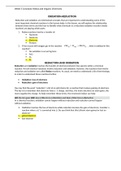Chem 120 concepts - Study guides, Class notes & Summaries
Looking for the best study guides, study notes and summaries about Chem 120 concepts? On this page you'll find 60 study documents about Chem 120 concepts.
Page 3 out of 60 results
Sort by
CHEM 120 / CHEM120 Week 5 Concepts Redox and Organic Chemistry GRADED A+ / CHEM 120 / CHEM120 Week 5 Concepts Redox and Organic Chemistry GRADED A+
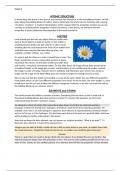
-
CHEM 120 Week 1 Concepts; Atomic Structure
- Other • 5 pages • 2023
- Available in package deal
-
- $20.99
- + learn more
ATOMIC STRUCTURE In many ways, this lesson is the start of your journey into chemistry. In this foundational lesson, we will learn about the building blocks of matter: atoms. Alchemists, the precursors to chemists, had a saying: “As above, so below”. A modern interpretation of this saying is that the properties of what we can see can help us understand the properties of what we cannot. In this lesson, we will learn how the properties of atoms determine the properties of the world around us.
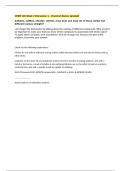
-
CHEM 120 Week 2 Discussion 1 - Chemical Names (graded)
- Exam (elaborations) • 1 pages • 2024
-
- $9.99
- + learn more
CHEM 120 Week 2 Discussion 1 - Chemical Names (graded) Sulfates, sulfites, nitrates, nitrites—how does one keep all of these similar but different names straight? Let’s begin this discussion by talking about the naming of different compounds. Why would it be important to make sure that you know which compound is associated with which name? To apply these concepts, look at problems 18 & 22 on page 122. Choose one part of the problem, & provide your answer. Check out the following ex...
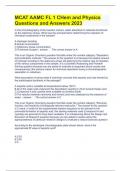
-
MCAT AAMC FL 1 CHem and Physics Questions and Answers 2023
- Exam (elaborations) • 20 pages • 2023
-
Available in package deal
-
- $24.49
- + learn more
MCAT AAMC FL 1 CHem and Physics Questions and Answers 2023 In the chromatography of the reaction mixture, water absorbed on cellulose functioned as the stationary phase. What was the principal factor determining the migration of individual components in the sample? A.Hydrogen bonding B.Solute concentration C.Stationary phase concentration D.Thickness of paper The correct answer is A. This is an Organic Chemistry question that falls under the content category "Separation and purificat...
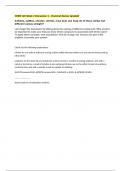
-
CHEM 120 Week 2 Discussion 1 - Chemical Names (graded)
- Exam (elaborations) • 1 pages • 2024
-
- $7.99
- + learn more
CHEM 120 Week 2 Discussion 1 - Chemical Names (graded) Sulfates, sulfites, nitrates, nitrites—how does one keep all of these similar but different names straight? Let’s begin this discussion by talking about the naming of different compounds. Why would it be important to make sure that you know which compound is associated with which name? To apply these concepts, look at problems 18 & 22 on page 122. Choose one part of the problem, & provide your answer. Check out the following ex...
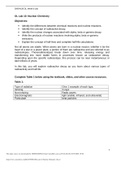
-
CHEM 120 Unit 6 Lab: OL Lab 10: Nuclear Chemistry (GRADED A)
- Exam (elaborations) • 6 pages • 2022
-
Available in package deal
-
- $10.99
- 1x sold
- + learn more
CHEM 120 Unit 6 Lab: OL Lab 10: Nuclear Chemistry Objectives: Identify the differences between chemical reactions and nuclear reactions. Identify the concept of radioactive decay. Identify the n uclear changes associated with alpha, beta or gamma decay. Write the products of nuclear reactions involving alpha, beta or gamma emissions. Explain the concept of half-lives and complete half-life calculations. Not all atoms are stable. When atoms are born in a nuclear reactor, whether it be the heart o...
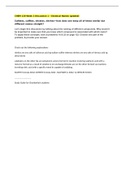
-
CHEM 120 Week # 2 DQ 1 – Chemical Names (graded)
- Case • 1 pages • 2023
-
- $9.69
- + learn more
CHEM 120 Week 2 Discussion 1 - Chemical Names (graded) Sulfates, sulfites, nitrates, nitrites—how does one keep all of these similar but different names straight? Let’s begin this discussion by talking about the naming of different compounds. Why would it be important to make sure that you know which compound is associated with which name? To apply these concepts, look at problems 18 & 22 on page 122. Choose one part of the problem, & provide your answer. Check out the following ex...
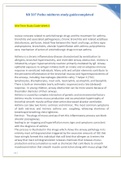
-
NR 507 Patho midterm study guide completed
- Exam (elaborations) • 62 pages • 2022
-
Available in package deal
-
- $16.99
- + learn more
NR 507 Patho midterm study guide completed Mid-Term Study Guide Week 4 review concepts related to anticholinergic drugs and the treatment for asthma, bronchitis and associated pathogenesis; chronic bronchitis and related acid/base disturbances, perfusion, blood flow between the heart and lungs, asthma signs and symptoms, bronchioles, alveolar hyperinflation with asthma, polycythemia vera; mechanism of action of anticholinergic drugs to treat asthma Asthma is a chronic inflammatory dis...
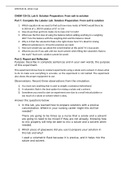
-
CHEM 120 OL Lab 6: Solution Preparation: From salt to solution
- Exam (elaborations) • 2 pages • 2022
-
- $12.49
- 1x sold
- + learn more
CHEM 120 OL Lab 6: Solution Preparation: From salt to solution Part 1: Complete the Labster Lab: Solution Preparation: From salt to solution 1. Which equation do we need to find out how many moles of NH4Cl would there be in 500 ml of a .300 M solution of it? n= CxV 2. How do we then get from moles (n) to mass (m)? m=nxM 3. What was the first step of using the balance before adding anything to a weighing dish? Tare the balance with the weighing dish and the balance closed 4. Why is it that t...
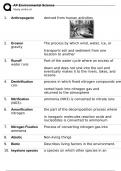
-
AP Environmental Science
- Exam (elaborations) • 83 pages • 2023
-
- $14.09
- + learn more
1. Anthropogenic derived from human activities 2. Erosion The process by which wind, water, ice, or gravity transports soil and sediment from one location to another 3. Runoff Part of the water cycle where an excess of water runs down and does not sink into the soil and eventually makes it to the rivers, lakes, and oceans. 4. Denitrification process in which fixed nitrogen compounds are con- verted back into nitrogen gas and returned to the atmosphere 5. Nitrification ammonia (NH3) is conv...

Study stress? For sellers on Stuvia, these are actually golden times. KA-CHING! Earn from your study resources too and start uploading now. Discover all about earning on Stuvia

